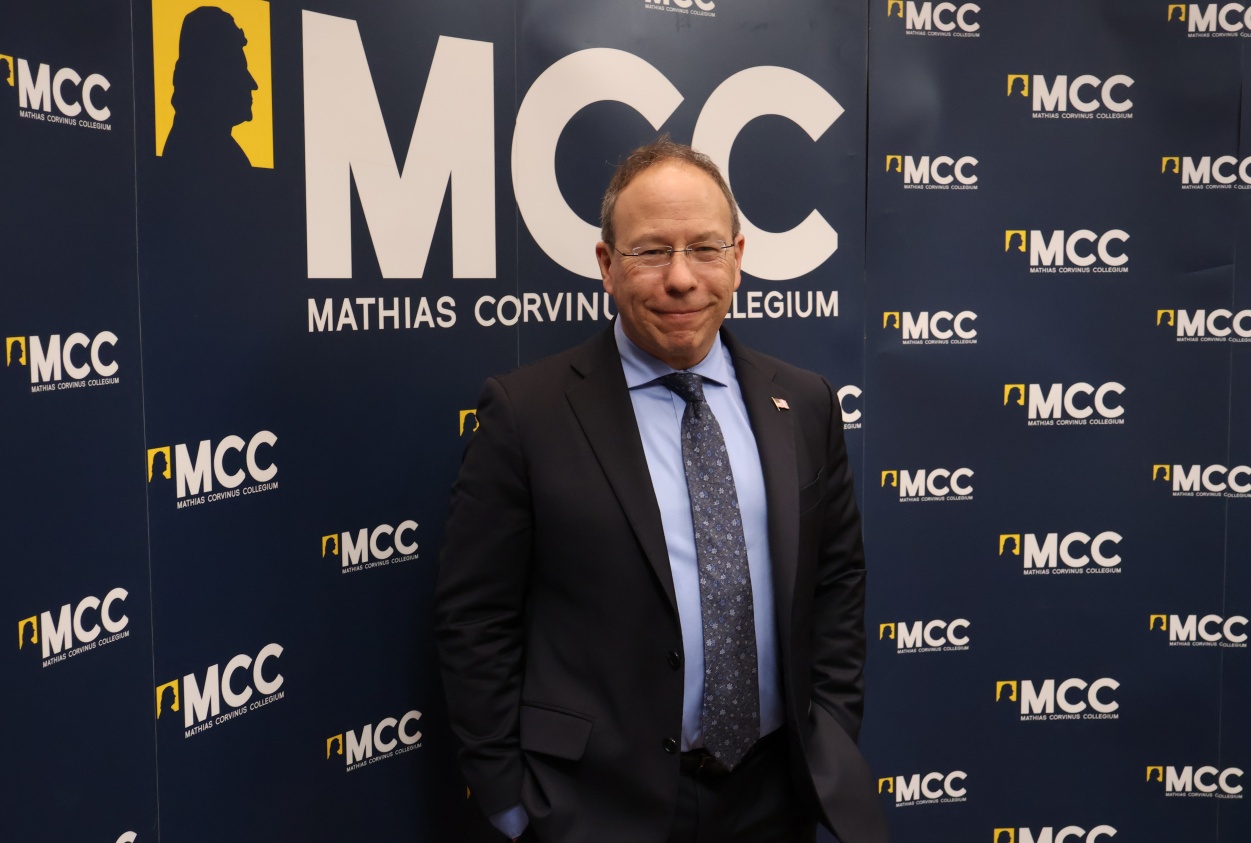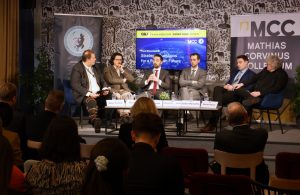
The goal is to be among the top 25 innovators in the world and among the top 10 innovators in Europe.Continue reading

We met with Prof. Adam Candeub at the conference entitled “Reclaiming our European Future” in Budapest, organized by the Mathias Corvinus Collegium (MCC). We asked the the former telecommunications and information advisor to President Donald Trump about the struggle for free speech in the cyberspace and digital censorship.
HT: What brings you to Hungary? What is the message that you would like to convey to your Hungarian audience?
AC: I came to Hungary through an academic colleague, because many Americans look to Hungary as an example and inspiration. As a country that is resisting some of the outrageous things that come out of Brussels. For instance, the vision of nation-states that maintain their sovereignty, but still cooperate with each other in a peaceful and mutually beneficial way, rather than bending the knee before unelected bureaucrats. I think that is something that Americans like, and it is also a point of commonality.
As a university professor, could you tell us what is the image that the average American student has about Hungary? Does this country come up in discussions during lectures, and what do your students make of some of the controversies in which Hungary has been involved in in the recent past?
Frankly, many of my students could not identify Hungary on the map.
But for many of the conservative or Catholic students, Hungary does stick out as an example of people saying “NO.”
I do not think the characterization of Hungary as a politically retrograde place is really followed or believed outside very small circles of very liberal people, who strongly care about the EU. Most Americans do not care about the EU, it does not get on their radar. That sort of rhetoric only gets on the radar of people on the left who have agendas and care about it.
Hungarian conservative political circles or media have in the past few years found themselves on the receiving end of giant US tech companies’ whims, having their platforms removed, or their circulation restricted. Checks and balances that were supposed to prevent this seem to have failed. The US has become a sort of a legal “freedom of speech tax haven” for companies who can do this with impunity. Is anyone aware of the damage that this is causing to fragile new democracies in Europe and beyond?
No, and I wish they did more. When I left President Trump’s administration, I was very involved with state laws being passed to prohibit viewpoint discrimination on platforms. We have been successful in making precisely what you are talking about illegal in the state of Texas. This Monday (February 26) our Supreme Court will be hearing arguments on the appeal regarding this report. If the law that we have passed is upheld by the Supreme Court, it will respond to a lot of problems that you have mentioned.
I think the point you are making is unfortunately lost among most American opinion-makers. They do not realize that people see America as supporting these corporations and firms that are going around censoring people and are shifting discourse. They make sure that public debate comes out a certain way that they like. I do not think that people really recognize that. It pains me.
I recognize myself as an American, because we supported freedom, and we hoped that people around the world look to us. I do not think they do any more.
Tech companies based in California with an overwhelmingly liberal outlook, rooted in multicultural societies, making judgements about content coming from conservative, ethnically homogeneous societies. This was never going to be a working combination, was it?
No, it is not. There is actually another case at the Supreme Court, Murthy v. Missouri, which takes the idea into the domain of censorship. What is alleged here is that government worked with social media platforms to silence certain people. For instance, during the COVID epidemic,
they clearly conspired with the Department of Homeland Security, the White House, to put pressure on the platforms to silence critics of their policies.
It is on Twitter files that Elon Musk released. The platforms are acting as state actors, but the first amendment prevents them from what they are doing. So we will see what happens in court.
Getting back to your point, I do not think these are only the prejudices of Silicon Valley, these prejudices have infested the highest echelons of the American government. And they see it as their job to protect these values. We will see how successful the rest of America is in saying “No.”

Photo: Hungary Today
Is this a situation in which some tech geeks are trying to dream up rules governing the freedom of speech, or one where the inherently flawed rules they have come up with end up intertwined with political interests?
Anyone interested in this question should go take a look at the Biden v. Missouri, now Murthy v. Missouri case. What one sees is horrifying. This is what Elon Musk, very much to his credit, revealed in the Twitter files. He showed that government worked with non-profits, with academics, particularly with the Stanford Internet Observatory. These non-profit cut-outs were set up to track information using somewhat advanced technology; they created a system for flagging uncomfortable posts, which they would submit to CISA (Cybersecurity Infrastructure Security Administration). Then CISA would give a call to the platforms. They had plausible deniability saying they are just forwarding information. But of course they are forwarding information from these cut-outs that they have created, which have an incentive for all parts of the revolving door – the non-profits, the government, the academia, and of course, the tech companies themselves.
So it is not just well-meaning nerds sitting in their basements, it is part of a very deliberate strategy to shift the debate.
You have mentioned how Americans do not realize how badly the world looks at it when they see these companies acting in this manner. I do not think Americans even realize how their own first amendment rights are violated. It is the proverbial frog being boiled slowly. I do not think they realize that they have become used to having their expression limited. Not just online but also in academia, in workplaces, where, for instance, there are oppressive sexual harassment guidelines.
They have just learned to become sheep, and that is my fear.
In smaller countries, large tech companies have digital content partners, who are monitoring the local political and media landscape on their behalf. Account closures and penalties are usually made on their recommendations. Are governments paying enough attention to the activities of these small companies, who have such an effect on the freedom of speech?
Well, someone who has recognized the value of this is Brussels. If you look at the Digital Services Act, it is abhorrent. What it does is precisely what you say. It says there has to be this “trust,” they call them “trusted flaggers.” And of course they become trusted by going to the government to be certified. I do not know how these trusted flaggers are paid, for instance. That is the interesting thing. But they submit their little flaggings to the big companies and they in turn are required by law to give them prompt and due consideration. They have to judge them by these “voluntary” rules of conduct which they adopt voluntarily, but of course they are invited to do so by the government.
So we have this very strange pattern of censorship. It started in the US, and it is our “wonderful” export, where government works with non profits, with plausible deniability.
But everybody knows what is going on. This is not freedom, not democracy. It is quite sinister.
In neighboring Slovakia, only a week prior to the elections, the US ambassador proudly confessed to being instrumental in shutting down a Slovak MP’s Facebook account. Needless to say, he was not removed from his post, but how did digital censorship of host countries become the new normal in US diplomacy?
It is shameful. Meanwhile, they are constantly deluded about Russia interfering with our lives. Americans cannot have it both ways, complaining bitterly about Russia interfering with our elections…Countries interfere with each other’s elections, but they should not do it. It is shameful, and I regret that, I feel bad for those Slovaks.
That is not our business, not what democracies should be doing to each other.
There are tech giants now who are challenging the monopoly of Facebook and other platforms. X has become a platform that openly goes against the left-leaning global narrative, and the Chinese owned Tik-Tok is also offering an alternative to the dominant rules governing freedom of speech. Is there a shift towards a broader global narrative than the one previously rubber-stamped by the Western liberal elite?
Competition is always good, but if you look at the power that Facebook, Instagram, and Google exert, then Twitter acts as small potatoes compared to what they do. For democracies to work, you need people to be able to talk to each other. You can ban dirty words or dirty pictures from a platform, but you cannot ban ideas. And that is what they (tech companies) do.
I have been working in Washington D.C. for a while and you experience first hand the power of these corporations. American democracy has never been very good at dealing with the excesses of big corporations. You can go back to the 19th century when railway companies were given carte blanche and concessions over national property. We are just not good at that.
Ironically, the EU, because it is more independent, has been the most successful in regulating these big companies.
They have done it for their own purposes, but as far as anti-trust violations, they have been the most successful.

Photo: Hungary Today
What could be the logical end to private, supranational companies controlling the rules of free discourse?
For most of my life, people looked dismissively at academia and universities, saying “oh well, they are just crazy liberals.” But of course what happens there spreads out to society and we become them in many respects. So as a university professor, I see a society that is very much what big tech and government wants it to be. Very left-wing, very sheep like, everyone reporting on each other for various violations. People there are atomistic, lonely. and unhappy. Some way I fear that that might be the goal. That sounds very dystopian and paranoid. But people can join together and say “No, we are not interested in being part of a globalist, transnational vision, we just want to be part of our own community, we want to build our own traditions, to stick to our own morality.” It is very difficult when government is working with big tech against the rest of society.
This is not really different from past models though, when government was joined by big corporations to control society.
But this is a new and more powerful iteration. One of the weaknesses of the American constitutional system is that it is very easy for corporations, or any wealthy group, to shift the discussion. This is our main challenge. I am not sure if this is the goal, or if this will happen, but
there definitely is a risk of a very homogenized world where everyone is looking out after each other and all are spouting the same story.
Fact
Professor Candeub joined the Michigan State University (MSU) Law faculty in 2004. He is also a Fellow with MSU’s Institute of Public Utilities. Prior to joining MSU, he served as an advisor at the Federal Communications Commission (FCC). Professor Candeub’s scholarly interests focus on the law and regulation of communications, internet, technology. He often writes for popular outlets such as the Wall Street Journal and US News.
He joined the Trump administration in 2019, as Deputy Assistant Secretary of Commerce for Telecommunications and Information and assumed the role of Acting Assistant Secretary. He later joined the Department of Justice as Deputy Associate Attorney General.
Professor Candeub is a senior fellow at the D.C.-based Center of Renewing America.
Featured Image: Hungary Today